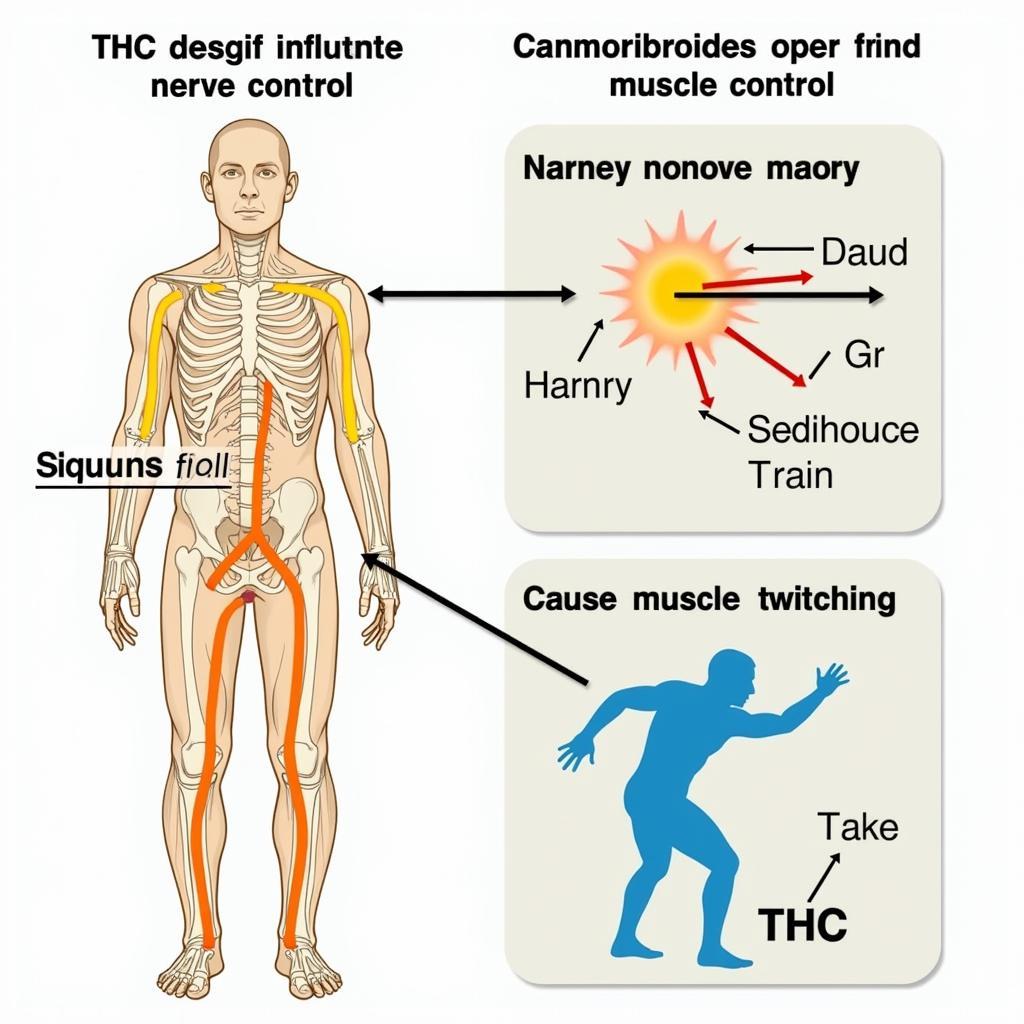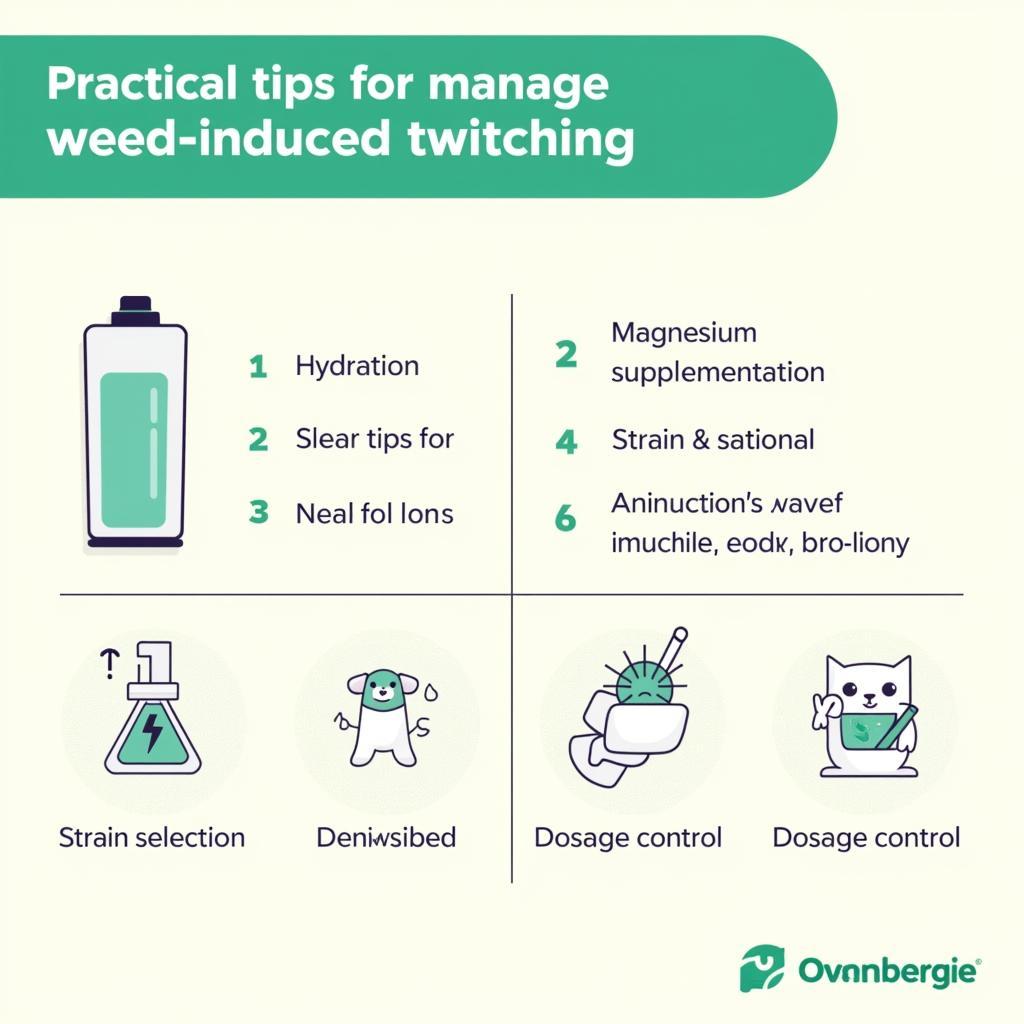Why Do I Twitch When I’m High on Weed?
November 10, 2024Experiencing muscle twitches after consuming cannabis is a relatively common phenomenon. Why do you twitch when you’re high on weed? Several factors can contribute to these involuntary muscle spasms, ranging from the specific strain of cannabis used to individual physiological responses. Understanding these factors can help demystify this experience and provide some strategies for managing it.
Decoding the Weed Twitch: Causes and Contributing Factors
Cannabis interacts with our body’s endocannabinoid system, a complex network of receptors and neurotransmitters that play a role in various physiological processes, including muscle control. While the exact mechanisms behind weed-induced twitching are not fully understood, several theories exist.
THC’s Role in Muscle Contractions
THC, the primary psychoactive compound in cannabis, can influence the communication between nerves and muscles. This interaction can sometimes lead to involuntary muscle contractions or twitches, especially at higher doses. Different strains of cannabis contain varying levels of THC, and strains with higher THC concentrations may be more likely to induce twitching.
Cannabinoid Receptor Activation
The activation of cannabinoid receptors, particularly CB1 receptors located in the brain and spinal cord, may also play a role in muscle twitching. These receptors are involved in regulating movement and coordination, and their stimulation by THC can sometimes disrupt these processes.
Individual Differences and Sensitivity
Individual responses to cannabis can vary significantly. Some people may be more sensitive to its effects on muscle control than others. Factors such as genetics, body weight, metabolism, and tolerance can all influence the likelihood and intensity of twitching.
 Weed Twitching and the Nervous System
Weed Twitching and the Nervous System
Dehydration and Electrolyte Imbalance
Cannabis consumption can sometimes lead to dehydration, which can in turn disrupt electrolyte balance. Electrolytes like potassium and magnesium are essential for proper muscle function, and imbalances can contribute to muscle cramps and twitches.
Anxiety and Stress
Anxiety and stress are known to exacerbate muscle tension and can potentially increase the likelihood of twitching, especially in individuals prone to anxiety. Cannabis can sometimes induce anxiety in some users, further contributing to this phenomenon.
Managing Weed-Induced Twitching: Practical Tips
While twitching after consuming cannabis is usually harmless and temporary, it can be uncomfortable. Here are some strategies to manage it:
- Hydration: Drinking plenty of water before, during, and after consuming cannabis can help prevent dehydration and maintain electrolyte balance.
- Magnesium Supplementation: Some individuals find that supplementing with magnesium can help reduce muscle twitching.
- Strain Selection: Opting for strains with lower THC content may decrease the likelihood of experiencing twitches.
- Dosage Control: Starting with a low dose and gradually increasing it can help minimize the risk of adverse effects, including muscle twitching.
 Tips for Managing Weed-Induced Twitching
Tips for Managing Weed-Induced Twitching
Expert Insights: Dr. Anya Sharma, Neurologist
“While more research is needed to fully understand the complex relationship between cannabis and muscle function, it’s clear that individual responses can vary greatly. Factors such as genetics, dosage, and strain all play a role.”
Expert Insights: Dr. Ben Carter, Cannabis Researcher
“The endocannabinoid system is a complex and fascinating area of study. As we learn more about its intricacies, we’ll gain a better understanding of how cannabis affects various bodily functions, including muscle control.”
Minimizing the Twitch: Proactive Strategies
Beyond managing the twitch itself, you can take proactive steps to reduce the likelihood of experiencing it in the first place:
- Mindful Consumption: Paying attention to your body’s signals and avoiding overconsumption can help minimize adverse effects.
- Stress Management Techniques: Practicing relaxation techniques such as deep breathing or meditation can help reduce anxiety and muscle tension.
- Balanced Diet: Consuming a balanced diet rich in essential nutrients can support overall muscle health.
Conclusion: Understanding the Weed Twitch
Why do you twitch when you’re high on weed? While the exact mechanisms are still being explored, understanding the potential contributing factors can empower you to manage this experience. By staying hydrated, being mindful of dosage, and managing stress, you can minimize the likelihood and intensity of weed-induced twitching.
FAQ
- Is twitching after consuming cannabis a sign of a serious problem? Generally, no. It’s usually a temporary and harmless side effect.
- Will the twitching go away on its own? Yes, in most cases, the twitching will subside as the effects of cannabis wear off.
- Are there any long-term effects of weed-induced twitching? There is no evidence to suggest that weed-induced twitching causes any long-term health problems.
- Can I prevent weed-induced twitching? While it’s not always possible to completely prevent twitching, following the tips outlined above can significantly reduce the likelihood.
- Should I consult a doctor if I experience severe or persistent twitching? If you experience any unusual or concerning symptoms, it’s always best to consult a healthcare professional.
For further information, check out our articles on “Understanding Cannabis Strains” and “The Endocannabinoid System Explained”.
When you need support, contact us at Phone Number: 0915117113, Email: [email protected] Or visit us at: To 3 Kp Binh An, Phu Thuong, Vietnam, Binh Phuoc 830000, Vietnam. We have a 24/7 customer service team.